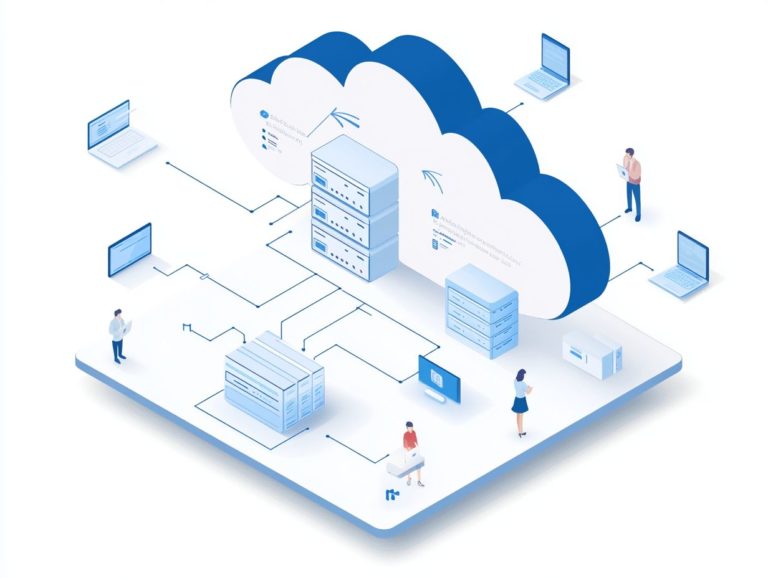5 Security Features to Look for in Cloud Storage
In today s digital landscape, securing sensitive data in the cloud is essential for businesses of all sizes. As you navigate the shift to cloud storage solutions, understanding the key security features is crucial.
Discover five game-changing features that will supercharge your data protection efforts! This article delves into critical components like end-to-end encryption and multi-factor authentication that can significantly bolster your data protection strategy. It also highlights the risks associated with insecure cloud storage and provides valuable guidance on selecting the right provider to effectively safeguard your assets.
Explore how you can elevate your cloud security strategy to new heights.
Contents
- Key Takeaways:
- 1. End-to-End Encryption
- 2. Multi-Factor Authentication
- 3. Data Backup and Recovery
- 4. Access Controls and Permissions
- 5. Compliance with Industry Standards
- How Can Cloud Storage Providers Ensure Security?
- What Are the Risks of Using Insecure Cloud Storage?
- What Are the Key Components of a Secure Cloud Storage System?
- How Can a Business Choose the Right Cloud Storage Provider for Their Needs?
- What Are the Common Security Concerns with Cloud Storage?
- How Can a Business Mitigate Security Risks in Cloud Storage?
- Frequently Asked Questions
- What are the 5 essential security features to look for in cloud storage?
- How does end-to-end encryption enhance security?
- Why is data backup and recovery important?
- How do access controls improve security?
- Why should cloud storage have compliance certifications?
- How does activity logging enhance security?
Key Takeaways:

End-to-end encryption is an important security feature for protecting sensitive data in the cloud. It ensures that only authorized parties can access it. Multi-factor authentication (MFA) is a method that requires you to provide two or more verification factors to gain access to your account, adding an extra layer of security. Data backup and recovery are essential in case of a security breach or data loss, ensuring important information is not permanently lost.
1. End-to-End Encryption
End-to-end encryption is an important security feature in cloud storage. It ensures that only you, as an authorized user, can access sensitive data stored on remote servers.
This level of encryption protects your data from unauthorized access and potential data breaches. It establishes a solid framework for maintaining privacy regulations such as GDPR and HIPAA.
By encrypting your data at the source and only decrypting it at its intended destination, this technique safeguards your information as it travels across the internet. Cloud security providers (CSPs) play a crucial role in implementing these encryption solutions.
However, challenges like managing encryption keys or the risk of human error can jeopardize security. Advanced analytics can help tackle these issues by providing real-time insights into potential security threats.
These insights enable you to take proactive measures against attacks and enhance your overall data protection strategies.
2. Multi-Factor Authentication
Multi-factor authentication (MFA) is crucial for securing your cloud applications. It significantly reduces the risk of insider threats and unauthorized access to sensitive data managed by service providers.
By implementing various MFA methods something you know (like a password), something you have (such as a security token or smartphone app), and something you are (biometric verification) you can strengthen your defenses.
This layered approach boosts security and integrates seamlessly with robust access control measures. It ensures that only authorized personnel can access critical information.
Combining MFA with comprehensive access controls helps you safeguard against evolving threats and vulnerabilities. Ultimately, this fosters a more resilient digital environment for your organization.
3. Data Backup and Recovery
Data backup and recovery are essential components of cloud storage solutions. They provide a dependable means to restore your data in the face of cyber threats such as ransomware or even physical device failures.
As you explore various backup strategies, consider options like full, incremental, and differential backups. Each strategy offers unique advantages tailored to your specific data environment and compliance needs.
Your choice of service provider is crucial. They must ensure their cloud storage solutions align with industry compliance certifications, which can be enhanced by following 5 tips for organizing your cloud storage.
Examining case studies that spotlight successful data recovery can offer invaluable insights. These examples demonstrate how different organizations have effectively implemented strategies to mitigate data loss and bolster operational resilience.
Take charge of your cloud security today! Start applying these features to protect your data.
4. Access Controls and Permissions

Implementing strict access controls and permissions in cloud storage is essential for preventing unauthorized access and ensuring that only authorized personnel can view sensitive data. This becomes particularly crucial when considering the various access control models available, such as:
- Role-Based Access Control (RBAC), which restricts access based on a user’s role within the organization.
- Attribute-Based Access Control (ABAC), which grants access based on user attributes like department or clearance level.
- Discretionary Access Control (DAC).
Each model addresses unique needs based on your organization s structure and requirements. Effective key management is also crucial; it ensures that encryption keys are securely handled and distributed, protecting data integrity.
Compliance regulations like GDPR require you to adopt stringent access control measures to safeguard personal data, impacting your system design and highlighting the importance of maintaining a robust security architecture.
By addressing these elements, you can create a more secure environment that meets both operational needs and regulatory obligations.
5. Compliance with Industry Standards
Compliance with industry standards is essential for you as a cloud service provider. It ensures that you adhere to privacy regulations like GDPR and HIPAA while mitigating the risks tied to data breaches and maintaining customer trust. The significance of meeting these standards cannot be overstated.
If you fail to comply, you could face severe financial penalties, legal repercussions, and reputational harm. This not only risks losing clients but also invites heightened scrutiny from regulators.
Align your practices with industry benchmarks by conducting regular audits, implementing robust security protocols, and investing in ongoing training for your team.
Creating a culture of compliance and transparency boosts your credibility and strengthens client relationships.
How Can Cloud Storage Providers Ensure Security?
Cloud storage providers can ensure your security through a powerful blend of robust encryption and advanced security measures. For more detailed strategies, check out this guide on how to secure your cloud storage data. This trifecta collectively shields you against data breaches and other cyber threats.
To achieve such a high level of security, many providers implement end-to-end encryption, ensuring that your data is encrypted both at rest and in transit. This means only authorized users can access sensitive information.
Strict access controls play a crucial role here, allowing for user permissions that limit data visibility based on specific roles and responsibilities. Regular audits are conducted to assess compliance with industry standards and to identify potential vulnerabilities before they can be exploited.
By proactively tackling encryption challenges and continuously enhancing security protocols, cloud providers fortify their commitment to safeguarding your data against ever-evolving cyber threats. Implementing strategies for effective cloud security management ultimately fosters trust and confidence in their services.
What Are the Risks of Using Insecure Cloud Storage?
Utilizing insecure cloud storage opens the door to a myriad of risks, including unauthorized access, data breaches, and increased susceptibility to insider threats and Distributed Denial of Service (DDoS) attacks. All of these can severely disrupt your business operations.
Organizations like yours may confront legal actions and substantial recovery costs, making the case for robust security protocols more urgent than ever. You must prioritize encryption now to protect your sensitive data from threats.
Implement stringent access controls and conduct regular audits to effectively shield against these varied threats.
What Are the Key Components of a Secure Cloud Storage System?

A secure cloud storage system has several key components. These include strong encryption, effective access controls, and features to look for in a cloud provider to protect sensitive data.
Strong encryption makes sensitive files unreadable to unauthorized users. This significantly reduces the risk of data breaches.
Effective access controls, like multi-factor authentication, limit data access to authorized personnel only.
Service providers should update their systems regularly and use advanced threat detection technologies. Routine security audits are essential for maintaining security.
Training employees on security protocols further enhances security. This fosters customer trust and ensures data integrity.
How Can a Business Choose the Right Cloud Storage Provider for Their Needs?
Choosing the right cloud storage provider requires evaluating factors like data recovery, compliance, and scalability. It’s also beneficial to consider unique features of top cloud storage providers and prioritize strong security measures like encryption and multi-factor authentication.
Look for cost-effective solutions with transparent pricing to avoid hidden fees. Flexibility in hybrid options allows you to balance on-premises and cloud resources.
Reputable providers like Amazon Web Services and Google Cloud offer robust services that support your ongoing growth.
What Are the Common Security Concerns with Cloud Storage?
Common security concerns with cloud storage include data breaches and insider threats. To mitigate these risks, it’s important to follow the best practices for securing cloud data, as these can help prevent unauthorized access and compromise sensitive information.
Many organizations face breaches due to weak passwords or lack of multi-factor authentication. Insider threats account for nearly 30% of breaches, often caused by human error.
A significant number of companies fail to encrypt sensitive data in transit, making it vulnerable to interception.
To mitigate risks, cloud providers should implement robust access controls and enforce end-to-end encryption. Regular employee training on security protocols is also crucial.
How Can a Business Mitigate Security Risks in Cloud Storage?
You can reduce security risks in cloud storage by implementing strong data recovery protocols. Additionally, knowing how to assess cloud provider security features and following compliance regulations also helps combat threats like Distributed Denial of Service (DDoS) attacks.
Conduct regular security audits to identify vulnerabilities in your cloud infrastructure. Employee training on cybersecurity best practices is vital since human error is a weak link in security.
By fostering a culture of awareness, you can greatly reduce risk exposure. Adopting advanced technologies for threat detection allows you to respond quickly to emerging threats.
Frequently Asked Questions

What are the 5 essential security features to look for in cloud storage?
The five critical features include end-to-end encryption, data backup and recovery, access controls, compliance certifications, and activity logging. Understanding these essential features of a cloud security solution is crucial as they protect your data and ensure its privacy.
How does end-to-end encryption enhance security?
End-to-end encryption safeguards your data, allowing only you and the intended recipient to access it. If data is intercepted, it remains unreadable without the proper key, offering an added layer of security.
Why is data backup and recovery important?
Data backup and recovery are vital for preventing data loss due to system failures or cyberattacks. This feature allows you to restore your data, ensuring business continuity.
How do access controls improve security?
Access controls restrict who can view and interact with your data. By allowing only authorized users access, it significantly reduces the risk of breaches.
Why should cloud storage have compliance certifications?
Compliance certifications, like ISO 27001 and SOC 2, confirm that your provider adheres to industry-standard security practices. This guarantees that your data is managed securely and responsibly.
How does activity logging enhance security?
Activity logging tracks user actions within the cloud platform. This monitoring improves visibility, helping to identify any suspicious behavior and maintain data integrity.






